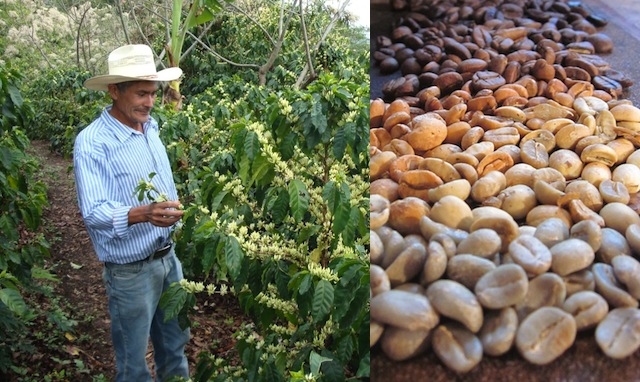By Sarah Zinn
If you happen across a café that serves THRIVE Farmers Coffee, your cup may as well be served straight from the worn hands of the Costa Rican farmer that grew the beans for its brew. And he would definitely be smiling.
THRIVE coffee is homegrown in the most literal sense. Giving farmers full access to the market place, it eliminates the need for importers, exporters, external roasters, middlemen, and brokers. By engaging in a higher level of the process, THRIVE’s business model allows coffee farmers, who are underpaid worldwide, to make a better living.
“By giving farmers a vested interest in the end product and consumer’s opinion, a better product will result and their livelihoods, communities and futures are benefitted,” Kenneth Lander, founder and president of THRIVE, said.
Lander understands firsthand the financial hardships of being a coffee farmer. Making a bundle off real estate back in Georgia, he retired and moved to Costa Rica and bought a coffee farm with the intention of growing coffee for fun. After the recession, Lander was hit hard and had to rely on the farm to feed his family. And he was barely making enough money to buy food, though he was part of a fair trade co-op.
Fair trade coffee farmers receive a guaranteed minimum of $1.40 a pound for Arabica coffee, in exchange for following environmental and labor standards dictated by the nonprofit organization Fair Trade International. By this model, being a fair trade coffee farmer only really affects your pay if the market price of coffee is lower than $1.40 per pound. Economic studies in Mexico and Nicaragua show that Fair Trade can prevent farmers from benefitting off high market prices, locking them in poverty.
Lander commends the efforts of Fair Trade International, but says that THRIVE offers a new market to these co-ops bringing significantly higher returns to the co-ops and their farmers.
“Fair Trade laid a foundation that has raised public awareness of the current economic and social conditions of small hold coffee farmers,” Lander said. “THRIVE’s model picks up where Fair Trade left off.”
Still, the issue of underpaid coffee farmers is pervasive around the world. Farmers with 5 acres of land or less grow 70 percent of the world’s coffee, yet are universally underpaid.
“A majority of these farmers are based in rural regions of developing nations, so those who grow it are not given a fair wage because they are not connected to anyone near the consumer,” Lander said.
The $100 billion coffee industry is second only to oil as the most traded commodity. With more than 300 farmers across six regions in three countries, THRIVE is on track to changing the way farmers are involved in the market of coffee. Lander is optimistic about the future.
“This problem is solved in one word: alignment””aligning what a farmer gets paid based on what a consumer is willing to pay for his coffee at the end of the supply chain,” Lander said.
THRIVE Farmers prides itself on being environmentally sustainable, and has also won awards for its economic practices. While Landers believes sustainability is important, he also thinks it goes beyond just the environment. He said THRIVE Farmers Coffee strives to be socially and economically sustainable as well.
“THRIVE Farmers first seeks to make the production of coffee economically sustainable,” Lander said. “Social and environmental sustainability can only truly occur when a farmer can first feed his or her family.”
ABOUT THE WRITER
 Sarah Zinn is currently a student at Indiana University studying Journalism. She’s a creative, passionate writer with a compulsion for wit. In her free time, she enjoys venturing outdoors, eating ethnic food, painting and on the rare occasion, sleeping. She is very interested in civil rights, the environment, public policy, and the arts. She has a curiosity for most things, excluding only finite math and stressfully dramatic shows such as CSI and 90210. She is a diehard fan of Seinfeld and most girl bands of the indie rock persuasion. The daughter of an expat, Sarah has called the state of Indiana, Athens GR, and London England home within the 19 years of her life. Sarah writes for her university’s newspaper the Indiana Daily Student, and has been published in Indianapolis Monthly Magazine. Follow her on Twitter @sarah_zinn.
Sarah Zinn is currently a student at Indiana University studying Journalism. She’s a creative, passionate writer with a compulsion for wit. In her free time, she enjoys venturing outdoors, eating ethnic food, painting and on the rare occasion, sleeping. She is very interested in civil rights, the environment, public policy, and the arts. She has a curiosity for most things, excluding only finite math and stressfully dramatic shows such as CSI and 90210. She is a diehard fan of Seinfeld and most girl bands of the indie rock persuasion. The daughter of an expat, Sarah has called the state of Indiana, Athens GR, and London England home within the 19 years of her life. Sarah writes for her university’s newspaper the Indiana Daily Student, and has been published in Indianapolis Monthly Magazine. Follow her on Twitter @sarah_zinn.




